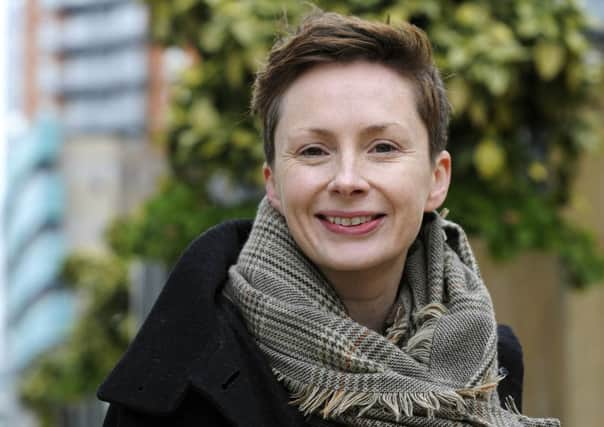Selina McGonagle: Artistic licence


Now, Selina McGonagle has taken on an even more challenging role as director of the Geraldine Connor Foundation and she intends to be just as transformative in her new role.
She has taken over the helm at the Yorkshire-based arts organisation following the departure of Amy Bere, who left last year.
Advertisement
Hide AdAdvertisement
Hide AdSince its foundation four years ago, The Geraldine Connor Foundation works to present a variety of creative projects that inspire and engage others through an experience of the arts in all its many different forms.
It was founded in 2012 to continue the legacy of the renowned theatre director, educationalist and ethno-musicologist, the late Dr Geraldine Connor, creator of the spectacular Carnival Messiah.
Lancashire-born Selina, who lives in Skipton with her husband and two children, Orla, seven and William, five says: “I thrive on developing creative opportunities that inspire and enthuse, artists, participants and audiences.
“One of my proudest achievements at Northern Ballet is the creation of a series of short ballets for children which gave emerging choreographers their first opportunity to create new work and also engage new audiences with dance.
Advertisement
Hide AdAdvertisement
Hide Ad“The productions have gone onto be broadcast through the BBC pre-school channel Cbeebies and win a few awards along the way including a BAFTA.
“I’ve always worked for dance organisations but this new role is not just one artform, it’s many.
“I’m speaking to photographers, musicians, dancers, film makers and theatre producers. The most important thing at the moment for me to do is listen to the artists.
“My new role at the Geraldine Connor Foundation enables me to create new fruitful partnerships and celebrate the diverse range of talent and skill we have in Yorkshire.”
Advertisement
Hide AdAdvertisement
Hide AdWhat that means is she is hoping to make the foundation even more engaging than it already is, using collaborations with artists, schools and other organisations to really help it branch out. But it’s a much bigger task than she first imagined.
“It’s all very fresh and new. I have a list of jobs to do as long as my arm. As a foundation, it has so many people connected with it. Geraldine’s list of contacts was huge. So, it’s challenging but in a good way.”
Selina has been involved with dance almost all her life, beginning classes when she was just two. She did an apprenticeship with TIN Arts and worked at Dance City in Newcastle upon Tyne. She was the education manager at Northern School of Contemporary Dance. While there, she was instrumental in establishing the Centre for Advanced Training (CAT) funded pre-vocational project Yorkshire Young Dancers, the first CAT project to be established outside of London. In 2011, she moved to Northern Ballet as its director and created the award-winning ‘short ballets’, which is now in its fourth year and regularly broadcast on CBeebies.
In 2012, she was invited by the British Council to take Northern Ballet Learning Team to Bejing and Hong Kong to work on inclusive dance projects.
Advertisement
Hide AdAdvertisement
Hide Ad“I love teaching and working with young people,” she says. “And giving them confidence through being creative. I believe the arts are for everyone and I’m interested in creating productions with the audience. I don’t know what that will look like yet. One thing I do know is it will be bigger and better.”
That’s something which is in keeping with the foundation, which staged two major performances in 2015: Tell Me What Yo’ Singin’ For, which celebrated the life and music of Edric Connor, Geraldine Connor’s father and pioneering Caribbean singer, folklorist and actor; and Sweet Chariot, a performance to mark the centenary of the death of Thomas Rutling, who was born into slavery in Tennessee and spent the last years of his life in Harrogate, with former Geraldine Connor student and ENO tenor Ronald Samm in the lead role. It’s most famous production was Carnival Messiah, first performed at West Yorkshire Playhouse in 1999.
As a mother, she’s keenly aware of how important it is to make dance and other arts productions accessible to children.
She says: “I took my daughter to the theatre to watch The Nutcracker at the Bradford Alhambra and that was something which made me really think about how to tailor arts productions for young people, because children won’t sit still through a whole performance.
Advertisement
Hide AdAdvertisement
Hide Ad“I can remember feeling the frowns of those around us as we sat there. I realised how awful those experiences can be for parents and so it got me thinking about how we make the arts accessible to children, something children could sit through.
“At the end of the day, whatever we do has to be relevant and one of my main aims is to ensure there’s a legacy, so it’s important to get that right if we want to be around in 10 years time.”
She adds: “When we can gather together, at concerts and theatres it is a real (not virtual) shared experience. These experiences make us interact with people outside our usual sphere [and] enable us look at the world from a different perspective and encourage us to think and reflect. By taking part in arts activity young people gain confidence through performance, resilience and motivation through aiming for perfection, the ability to work with other people and communicate ideas. These skills are not assessed by an exam, so their importance can be under-valued but they are the intrinsic skills that keep society together.”